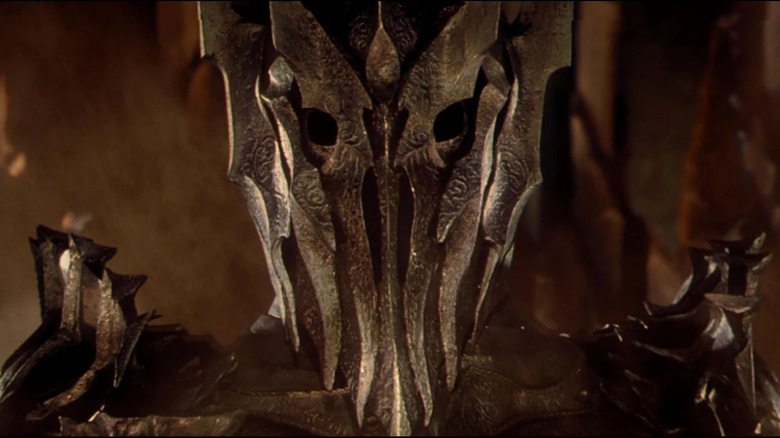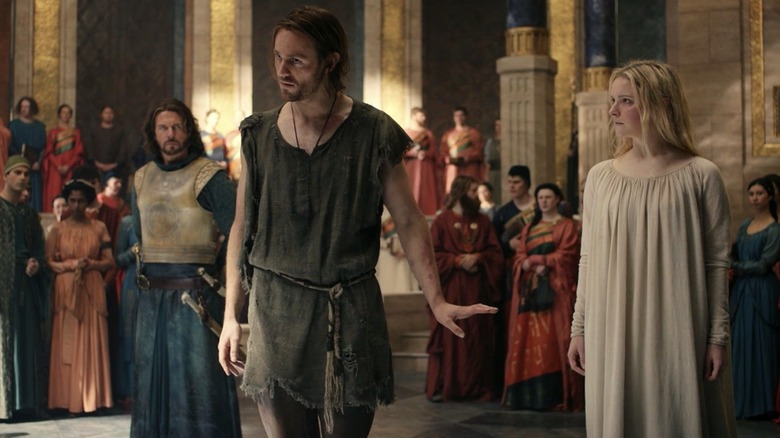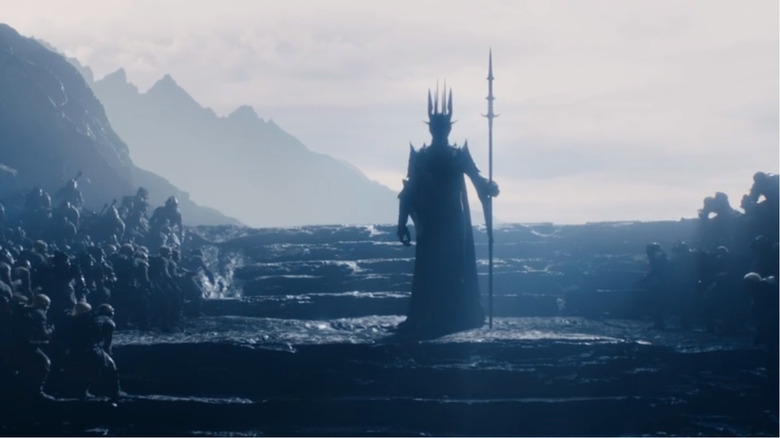Will LOTR: Rings Of Power S2 Depict Sauron Recruiting Humans For Battle?
Potential spoilers for "The Rings of Power" Season 2
Season 1 of "The Lord of the Rings: The Rings of Power" wrapped up in mid-October of 2022. Since that time, there has been little substantive information about what we can expect in Season 2. We know that the principal photography has wrapped and that there will be a lot of new faces in the upcoming season. But we don't even know when that season will arrive — a release date sometime in 2024 seems to be the current consensus.
As far as the content itself, we've been given little more than hints and riddles. For instance, Morfydd Clark suggested that there will be "quite a lot of new villains" in Season 2. The Galadriel actress also teased that more of the titular Rings of Power will be in circulation.
As is always the case with tentpole entertainment experiences, these official breadcrumbs coming "from the source" have been supplemented by a steady stream of leaks, unofficial reports, and speculation. Rumors of everything from the threat of Shelob showing up to multiple versions of Sauron has made the circuit of Tolkien fandom — and now there's a new tidbit to add to the plate. Fansite Fellowship of Fans has posted a fresh scoop claiming that Halbrand (who is Sauron in disguise) will be at a human village and "will be giving big speeches to the human village inhabitants. He also gives a very big speech to humans in a forest which was filmed in Surrey."
The thought of a villain haranguing the masses may not sound like a big deal at first glance. But it's the people he's talking to that makes this rumor really important ... if it ends up being true, that is.
Sauron is a big deal in the lands of Men
It's easy to polarize the races of Middle-earth, especially for those who have only seen Peter Jackson's films. You've got the Men, Elves, Dwarves, and Hobbits on one side and the Orcs, Goblins, Balrogs, Trolls, and Wargs on the other. Sure, there are a few evil-looking Men fighting on the wrong side, but they're hard to spot unless they're riding an Oliphaunt or wielding one of the Nine Rings of Power.
In J.R.R. Tolkien's writings, it's true that Sauron rarely gets along with Elves, and Dwarves are too stubborn for him to tame. Despite the stereotyping, though, it turns out Sauron is a really big deal in the lands of Men. "The Silmarillion" states that "Men he found the easiest to sway of all the peoples of the Earth." A bit later, the text explains how Sauron distributes the Rings of Power, saying, "Seven rings he gave to the Dwarves; but to Men he gave nine, for Men proved in this matter as in others the readiest to his will."
As if to fully drive home the point, a hop, skip, and a jump after this, Tolkien re-summarizes Men's weakness with the brief phrase, "Men proved easier to ensnare." It's a concept that we see time and again in "The Lord of the Rings," right? Boromir is the first to fall to the One Ring's temptation. His father has similar struggles. The entire point of sending Frodo to the Cracks of Doom to destroy the jewelry is driven by the fact that someone is going to crack under the pressure and seize the weapon of the Enemy to use against him. While anyone could be a culprit in this scenario, Men are the prime suspects from day one.
Sauron spends a lot of the Second Age chilling with Men
While Sauron is most often seen surrounded by Orcs, a lot of his earlier build-up to power is spent collaborating with Men. Just to be clear, we aren't talking about the Men of the island nation of Númenor — people like Isildur and Elendil. Nor are we referring to the later Men of Gondor or Rohan.
Sauron scores some of his biggest victories off in the east and south of Middle-earth — and he does it in the Second Age, i.e., during the period when "The Rings of Power" is set. The Silmarillion refers to this, summarizing the lengthy, multi-century act of slow conquest by saying, "In the east and south well nigh all Men were under his dominion, and they grew strong in those days and built many towns and walls of stone, and they were numerous and fierce in war and armed with iron." The depressing account ends with the intimidating words, "To them Sauron was both king and god; and they feared him exceedingly, for he surrounded his abode with fire."
So, while Sauron spends time tangling with the Elves and Men of the West in the primary story, he also invests significant resources into cowing the eastern and southern regions in between these activities. This is an out-of-sight, out-of-mind effort for the most part. But it does pop up from time to time. When Tolkien talks about his mysterious, underdeveloped pair of "Blue Wizards," for instance, he suggests that their primary goal in Middle-earth may have been to complement the anti-Dark Lord activity of their fellow Wizards (Gandalf, Saruman, and Radagast) by resisting Sauron's control over these other groups of Men scattered across Middle-earth.
What could Halbrand be giving speeches about?
Okay, so the thought that Sauron could be traveling around Middle-earth, putting various groups of men under his thumb, makes sense. But speeches? Why speeches? It turns out that Tolkien didn't see Sauron as a chaotic, destructive ruler. On the contrary, that kind of behavior was more like his master, the original Dark Lord Morgoth.
In contrast, Sauron is a lover of order and discipline from the beginning. He desires to see things put in their place — a passion that slowly becomes warped and twisted as he marches down the path of evil. Even Elrond is aware of this fact, and in "The Fellowship of the Ring" book, he declares to the council named after himself, "For nothing is evil in the beginning. Even Sauron was not so."
When Saruman tries to convince Gandalf to break bad with him, he reflects this same concept of blurring the line between evil and order by saying, "we can keep our thoughts in our hearts, deploring maybe evils done by the way, but approving the high and ultimate purpose: Knowledge, Rule, Order; all the things that we have so far striven in vain to accomplish, hindered rather than helped by our weak or idle friends. There need not be, there would not be, any real change in our designs, only in our means." In other words, Sauron — and by extension, Saruman — are masters at deluding themselves into seeing their evil actions as simply a means to control the chaos of the world. If it means they amass almighty power along the way and become the masters of slaves, so be it.
Halbrand could be preaching the order is peace message in Season 2
"The Rings of Power" already touched on this concept of a conflicted Sauron who is torn between doing greatness and evil. It's easy to see Halbrand steering into that same message as he offers a false hope of peace and order to the unhappy Men of Middle-earth — and that concept of "unhappy Men" isn't just a clever word choice. It's J.R.R. Tolkien's specific description of the condition of humankind during the Second Age.
"The Silmarillion" specifically states that early in that age, the Men who don't end up out on the island of Númenor are forsaken by the forces of good, adding, "And the evil Men came among them, and cast over them a shadow of fear, and they took them for kings." The text also says that they took the friends of Morgoth as their masters and says, "Men dwelt in darkness and were troubled by many evil things that Morgoth had devised in the days of his dominion: demons and dragons, and misshapen beasts, and unclean Orcs that are mockeries of the Children of Ilúvatar. And the lot of Men was unhappy."
This misery and despair set the stage for Sauron's initial rise as he casts his formidable shadow over these poor Humans and starts to intimidate them with his other-worldly power. The process is summarized once more in "The Silmarillion" when it says, "And in the south and in the further east Men multiplied; and most of them turned to evil, for Sauron was at work." If the rumors are true, we just might see some of this work firsthand when Season 2 arrives.




